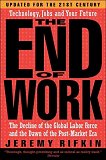
 THE AGE OF ACCESS by Jeremy Rifkin (hier online bestellen)
THE AGE OF ACCESS by Jeremy Rifkin (hier online bestellen)
The story:
In The Age of Access, Rifkin uses private property ownership, a sacred tenant of capitalism, to critique a
recent development in business: access to services and "commodification" of experience. Those familiar with
William Gibson's work (Neuromancer, Count Zero, etc.) will recognize his well-developed near-future scenario
of corporate control of all vital information and the commodification of experience.
Some examples Rifkin cites are:
Leasing: This is not limited to automobiles anymore. Now, even seeds farmers use to grow their crops may not
be reused; farmers must pay for the right to plant Monsanto-provided seeds each year.
Outsourcing: As has been the case for years, companies are aggressively divesting themselves of
capital-intensive functions and farming out non-core competencies to contractors at lower costs than
they experienced with the functions housed internally.
Franchising: McDonald's, Super 8, Subway, you name it, those businesses are for the most part not owned by
the home office, but are operated under licensing agreements with the grantee's franchising entity.
The commodification of cultural experiences: Native American casinos, guided tours of restored or replicated
historical sites (Colonial Williamsburg, for instance), Disneyland and, perhaps worst of all, malls, are
taking the place of authentic cultural exposure.
Extract from book:
"The new idea in marketing is to concentrate on share of customer rather than share of market. What these ideas
boil down to is the commodification of a person's entire lifetime of experiences. Marketing specialists use the
phrase "lifetime value," or LTV, to emphasize the advantages of shifting from a product-oriented to an
access-oriented environment in which negotiating discrete market transactions is less important than securing
and commodifying lifetime relationships with clients.
Automobile dealers estimate, for example, that each new customer that comes through the door of a Cadillac
dealership represents a potential LTV of more than $322,000. The figure is a projection of the number of
automobiles the customer is likely to purchase over his or her lifetime, as well as the services those
automobiles will require over their lifetime. The key is to find the appropriate mechanism to hold on to the
customer for life.
To calculate the LTV of a customer, a firm projects the present value of all future purchases against the
marketing and customer-service costs of securing and maintaining a long-term relationship. Credit card
companies and magazines, which rely on subscriptions and memberships, have long used LTV cost-accounting
projections. Now the rest of the economy is beginning to follow suit.
The commercial potential of capturing a share of customer is directly proportional to the projected duration
of his or her consumer lifetime. For that reason, many companies try to capture customers at an early age to
optimize their potential LTV."
About the author:
 Mr. Rifkin’s 2000 bestseller, The Age of Access, explores the vast changes occurring in the capitalist
system as it makes the transition from geographic markets to e-commerce networks and from industrial to
cultural production.
Mr. Rifkin’s 2000 bestseller, The Age of Access, explores the vast changes occurring in the capitalist
system as it makes the transition from geographic markets to e-commerce networks and from industrial to
cultural production.
Rifkin, president of the Foundation on Economic Trends, is the author of sixteen books on the impact of
scientific and technological changes on the economy, the workforce, society, and the environment. His books
have been translated into more than twenty languages and are used in hundreds of universities around the world.
His 1995 book, The End of Work, is an international bestseller that is widely credited with helping shape
the current global debate on technology displacement, corporate downsizing and the future of jobs. His
1998 bestseller, The Biotech Century, addresses the many critical issues accompanying the new era of genetic
commerce and is the most widely read book in the world on the biotech revolution.
In his newest book, The Hydrogen Economy, published in September 2002, Rifkin takes us on an eye-opening
journey into the next great commercial era in history. He envisions the dawn of a new economy powered by
hydrogen that will fundamentally change the nature of our market, political and social institutions, just
as coal and steam power did at the beginning of the industrial age.
Mr. Rifkin holds a degree in economics from the Wharton School of the University of Pennsylvania, and a
degree in international affairs from the Fletcher School of Law and Diplomacy at Tufts University. Rifkin
is an advisor to heads of state and government officials around the world and speaks frequently before
business, labor and civic forums. Mr. Rifkin currently serves as an advisor to Romano Prodi, President
of the European Commission, the governing body of the European Union. He has also lectured at more than
500 universities in some 20 countries in the past 30 years. Since 1994, Mr. Rifkin has been a fellow at
the Wharton School’s Executive Education Program, where he lectures to CEOs and senior corporate management
from around the world on new trends in science and technology and their impacts on the global economy,
society and the environment.
Buchdaten:
THE AGE OF ACCESS by Jeremy Rifkin
Sprache: Englisch
Broschiert - 312 Seiten - Penguin Putnam
Erscheinungsdatum: 1. März 2001
ISBN: 1585420824
Preis: € 12,95
More works from the same author:
zurück zur Übersicht
|
 THE AGE OF ACCESS by Jeremy Rifkin (hier online bestellen)
THE AGE OF ACCESS by Jeremy Rifkin (hier online bestellen)
 Mr. Rifkin’s 2000 bestseller, The Age of Access, explores the vast changes occurring in the capitalist
system as it makes the transition from geographic markets to e-commerce networks and from industrial to
cultural production.
Mr. Rifkin’s 2000 bestseller, The Age of Access, explores the vast changes occurring in the capitalist
system as it makes the transition from geographic markets to e-commerce networks and from industrial to
cultural production.



